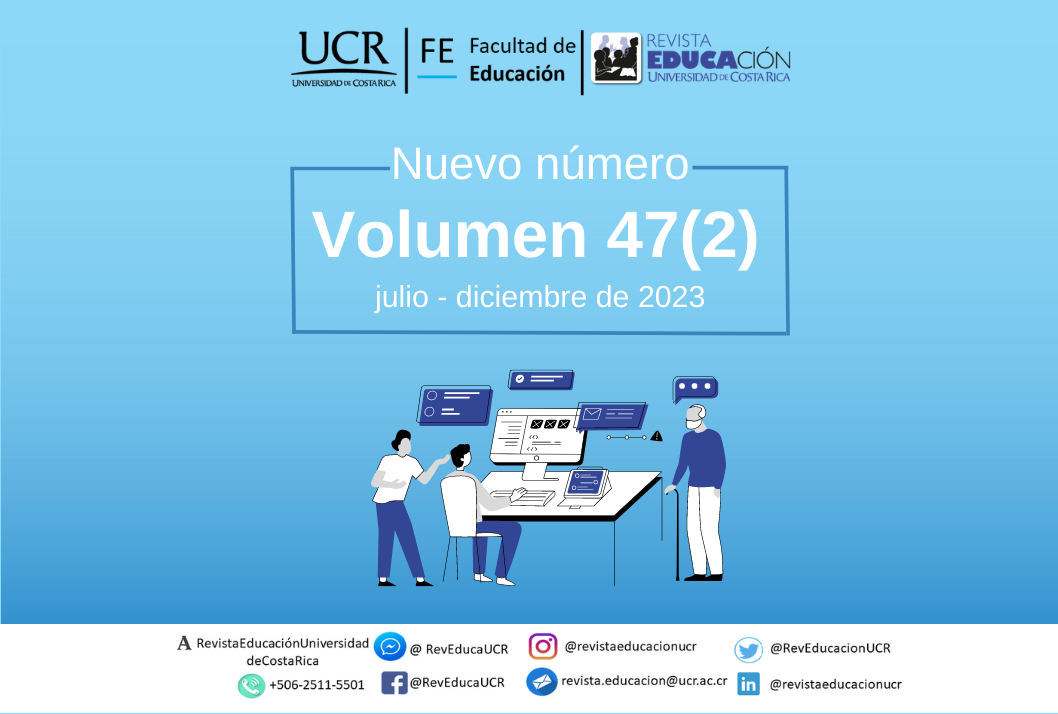Abstract
As the main objective, the researchers intended to show the teaching experience during the didactic guiding of students in the process of developing their final graduation projects for a bachelor's degree from the University of Costa Rica. As for the methodology, it consisted of a qualitative descriptive design of the academic experience in research courses, corresponding to Taller de graduación I and II, both with a semester duration. The participating population consisted of students of said courses during 2020 and 2021. In addition, the authors established the following three axes for data collection and analysis: a) learning modality, b) theoretical methodological approach of the courses, and c) tacit products of experience. Regarding the results, although virtuality represented a challenge for the change and achievement of learning, the methodology resulted in a successful process that considered the general principles of technology-mediated pedagogy, according to the University of Costa Rica. Likewise, the theoretical-methodological approach allowed the student body to conclude their proposals with an advanced degree or higher in 87.5% and 65% between 2020 and 2021, respectively. Just in 2020, 62.5% of students had proposals ready to be reviewed by the commission, or approved. Hence, the authors concluded that the graduation workshops (Talleres de graduación) need to be approached from the research methodology, in search of clarity and sequence in the stages, which would allow verifying the feasibility of the proposals, as well as prioritizing the development of research competencies over the complexity of the final product of the TFG. On the other hand, concerning the applications of the research, in guidance courses for final graduation projects, goals must be established in different terms so that the student body advances sustainably and consistently. Finally, the researchers recommend for future similar teaching practices to allow the graduated student population to share their experiences with those who are just starting and to establish their own work schedules for each research proposal as a tool for a work commitment.
References
Abreu, J. (2015). Síndrome Todo Menos Tesis (TMT) All But Thesis Syndrome. Daena: International Journal of Good Conscience. 10(2), 246-259. http://www.spentamexico.org/v10-n2/A14.10(2)246-259.pdf
Arnoux, E., Borsinger, A., Carlino, P., Di Stefano, M., Pereira, C. y Silvestre, A. (2004). La intervención pedagógica en el proceso de escritura de tesis de posgrado. Revista de La Maestría En Salud Pública. 2(3), 1-16. https://www.aacademica.org/paula.carlino/169
Calvo, M. (2009). La elaboración de la tesis de licenciatura como espacio para la formación y la construcción social del conocimiento. Perfiles Educativos, 31(124), 22-41. https://doi.org/10.22201/iisue.24486167e.2009.124.18826
Carlino, P. (2004). La experiencia de escribir una tesis: contextos que la vuelven más difícil. Anales Del Instituto de Lingüística. 24, 41-62. http://www.aacademica.org/paula.carlino/196.pdf
Carlino, P. (2005). ¿Por qué no se completan las tesis en los posgrados? Obstáculos percibidos por maestrandos en curso y magistri exitosos. Educere, Revista Venezolana de Educación. 9(30), 415-420. https://www.aacademica.org/paula.carlino/15
Casarín, M. (2016). Escritura de tesis: dificultades, desafíos y propuestas. Revista Pucara. 27, 179–188. https://publicaciones.ucuenca.edu.ec/ojs/index.php/pucara/article/view/2617/1690
Castro-Rodríguez, Y. y Lara-Verástegui, R. (2021). Experiencias y percepciones de los graduados de Odontología sobre la culminación de la tesis en una universidad del Perú. Odontología Sanmarquina, 24(3), 235–241. https://doi.org/10.15381/os.v24i3.20715
Difabio, H. (2011). Las funciones del tutor de la tesis en educación. Revista Mexicana de Investigación Educativa. 16(50), 935–959. https://www.redalyc.org/pdf/140/14019000012.pdf
Gascón, Y. (2008). El síndrome de Todo Menos Tesis “TMT” como factor in uyente en la labor investigativa. Copérnico. 5(9), 46–57. http://www.revencyt.ula.ve/storage/repo/ArchivoDocumento/copernico/v5n9/art05.pdf
Hernández, M. y Ferrer, Y. (2000). Factores que inciden en el Síndrome Todo Menos Tesis (TMT) en las maestrías de la Universidad del Zulia. Opción. 16(31), 112–129. https://dialnet.unirioja.es/descarga/articulo/2474955.pdf
López, D., Rábago, D. y Zavala, M. (2019, 9-12 de abril). De lo cualitativo a lo cuantitativo: experiencia en la asesoría de tesis en la escuela normal. [Sesión de congreso]. III Congreso Nacional de Investigación sobre la Educación Normal [CONISEN], Playas de Rosarito, Baja California, México. http://www.conisen.mx/memorias2019/memorias/1/P876.pdf
Martín, G. (2012). La escritura de tesis de posgrado en el área de investigación educativa. El acompañamiento, una pieza clave. CPU-e, Revista de Investigación Educativa, 15, 69–86. https://doi.org/10.25009/cpue.v0i15.21
Merino, R. (2019). Factores que influyen en la elaboración del proyecto de tesis de maestría. Acta Herediana. 62(1), 134–142. https://revistas.upch.edu.pe/index.php/AH/article/view/3616/4012
Mombrú, A. y Ambrosini, C. (2017). Bendita tesis: tribulaciones personales e institucionales. Perspectivas Metodológicas, 17(19). https://doi.org/10.18294/pm.2017.1442
Ochoa, L. (2009). La lectura y la escritura en las tesis de Maestría. Forma y Función. 22(2), 93–119. https://dialnet.unirioja.es/descarga/articulo/6454283.pdf
Ochoa, L. y Cueva, A. (2017). El bloqueo en el proceso de elaboración de una tesis de maestría: angustias y desazones percibidas por sus protagonistas. Lenguaje, 45(1), 61–87. https://doi.org/10.25100/lenguaje.v45i1.4614
Pereira, C. y Di Stefano, M. (2007). El taller de escritura en posgrado: Representaciones sociales e interacción entre pares. Revista Signos. Estudios de Lingüística, 40(64), 405–430. http://dx.doi.org/10.4067/S0718-09342007000200007
Ramos, E. (2022). Estrategia didáctica para el desarrollo exitoso de la investigación formativa en la educación superior. Risei Academic Journal. 2(1), 52–61. https://revista.risei.org/index.php/raj/article/view/28
Soto, C. H. (2020). Factores asociados a la elaboración de tesis en la Universidad Nacional de Asunción, Paraguay. Actualidades Investigativas en Educación, 20(2), 24. https://doi.org/10.15517/aie.v20i2.41676
Zimányi, K., Ortiza, A., Marie, P., Houde, A. y Richter, K. (2022). Deserción escolar en dos licenciaturas en la enseñanza de lenguas: un estudio de caso en una universidad pública en México. Revista de Educación Superior. 51, 89–116. http://189.254.1.230/ojs/index.php/resu/article/view/2220/622

This work is licensed under a Creative Commons Attribution-NonCommercial-NoDerivatives 3.0 Unported License.
Copyright (c) 2023 Revista Educación - Journal of Education


